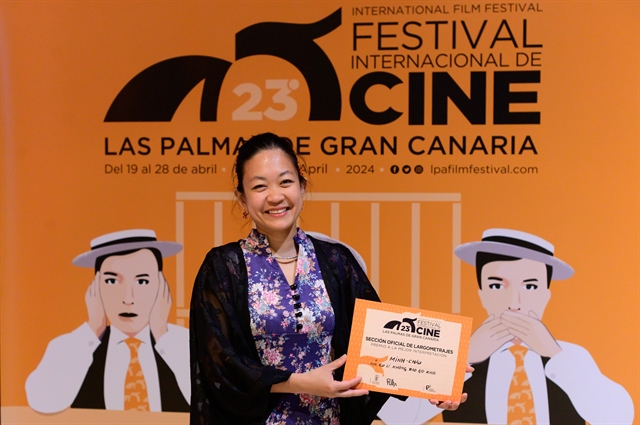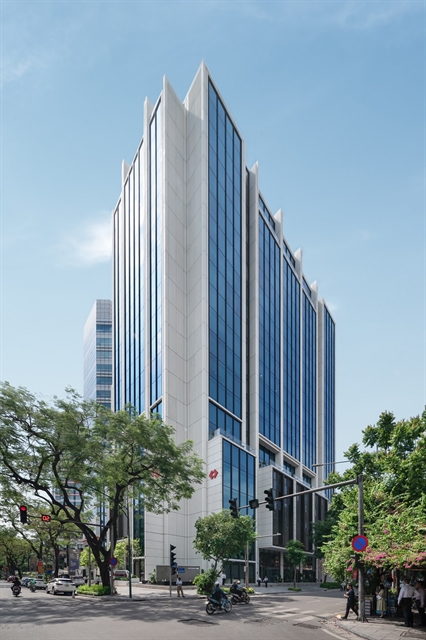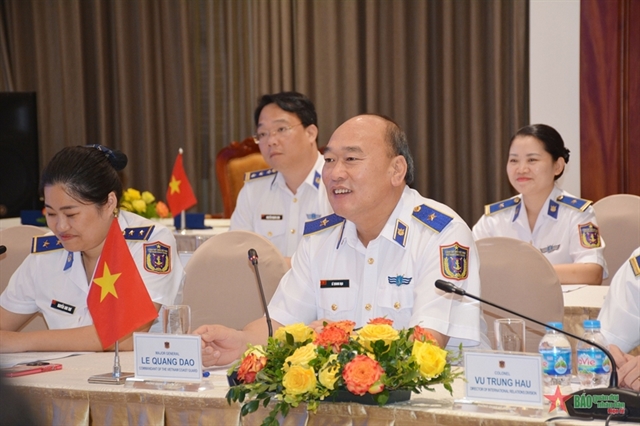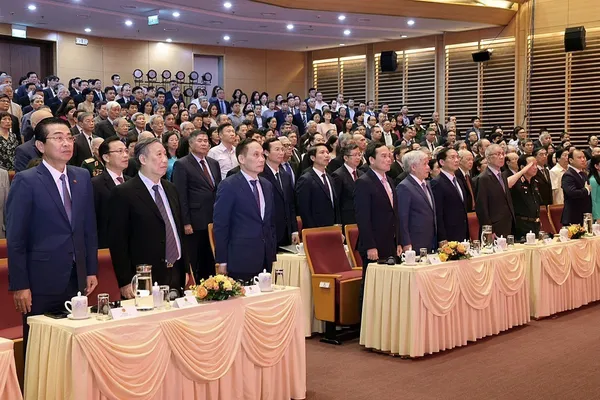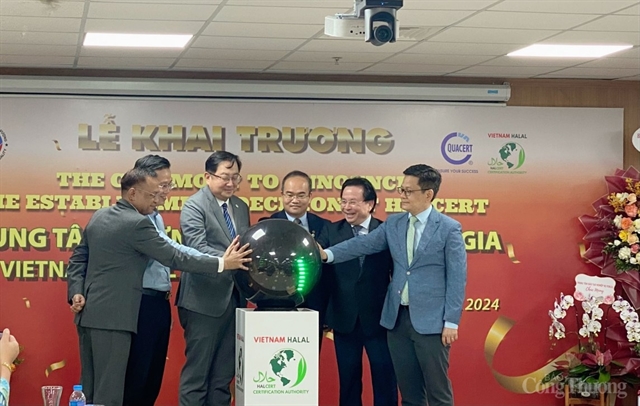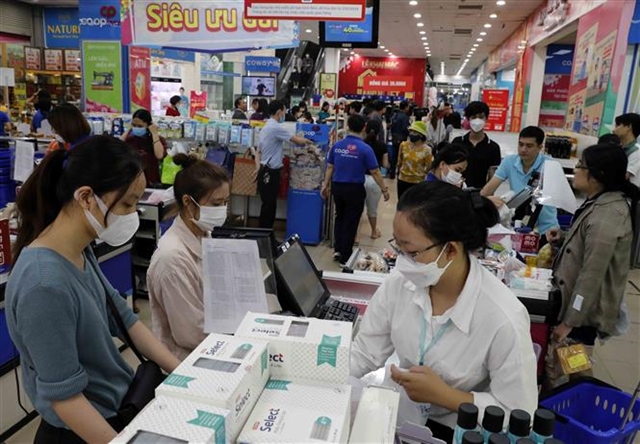 Politics & Laws
Politics & Laws
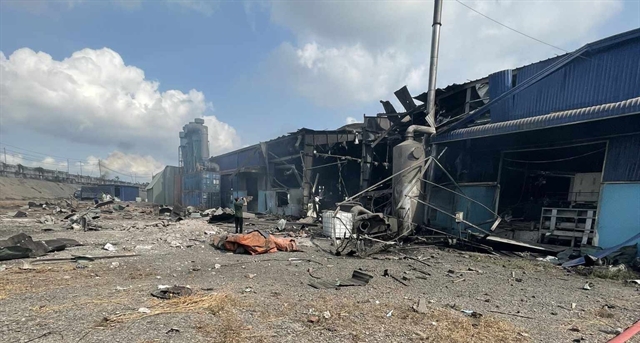
President Trần Đại Quang said on Thursday that together with other inter-parliamentary groups, the Asia-Pacific Parliamentary Forum could help promote world development that originated in Asia and the Pacific.
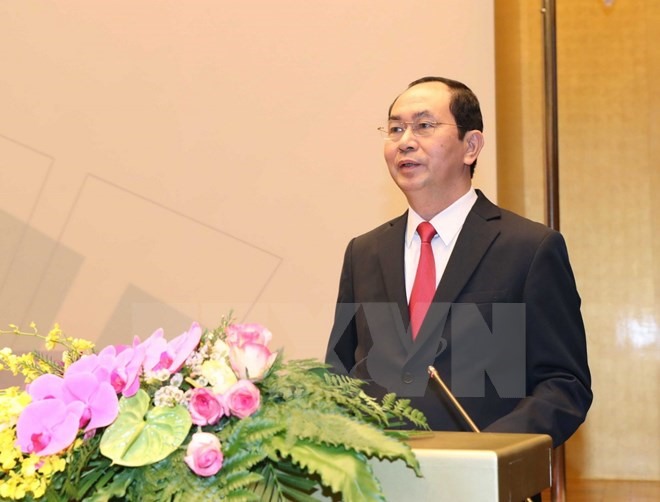 |
| President Trần Đại Quang speaks at the Asia-Pacific Parliamentary Forum in Hà Nội on Thursday.— VNA/VNS Photo Nhan Sáng |
Viet Nam NewsHÀ NỘI — President Trần Đại Quang said on Thursday that together with other inter-parliamentary groups, the Asia-Pacific Parliamentary Forum could help promote world development that originated in Asia and the Pacific.
“In the past 25 years, APPF has witnessed turning points in the world and was also part of the process," Quang said.
He said the APPF had helped make the Asia Pacific an innovation hub that was a pioneer in developing technology industries, new energy, trade and investment, and this had benefited hundreds of millions of people, he said.
The forum, which enables parliamentarians to discuss issues of common concern, began its twenty sixth session in Hà Nội on Thursday.
Vietnamese National Assembly leader Nguyễn Thị Kim Ngân told the meeting that parliamentary diplomacy in the Asia-Pacific area had been promoted by the active engagement of parliamentarians at inter-parliamentary meetings, delegates from Việt Nam and world organisations.
She said the forum would promote friendship, combat terrorism and other trans-boundary crimes, and expand trade, investment, prosperity and sustainable development revolving around the agenda of APEC Summit.
She said it would also address regional co-operation on climate change and other new challenges.
“The 21st century has witnessed the vigorous development of globalisation, digital technology revolution and global value chains," she said.
"This has transformed the world economy. Although it has recovered, there remains uncertainty and uneven development. The world is at an important turning point which gives us new tasks and missions, and requires us to consolidate achievements.
“APPF allows the voice of our parliamentarians to be heard in regional and international matters,” she added. “Promoting seamless regional economic integration is a top priority of world co-operation, particularly in the Asia-Pacific region."
The forum continues today with three plenary sessions.
The first plenary session will focus on promoting parliamentary diplomacy for peace, security and prosperity in the region and the world. The second plenary session will focus on economic co-operation, and the third will address regional co-operation.
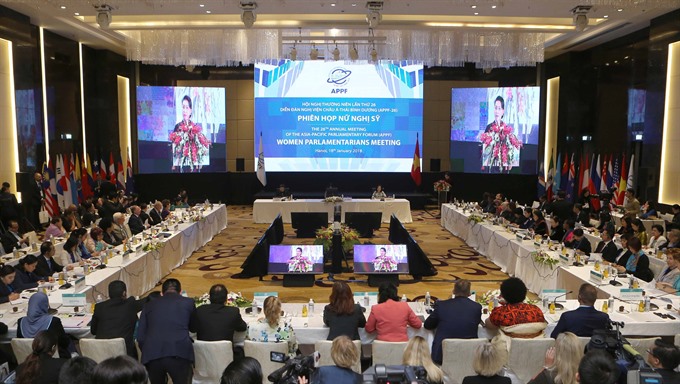 |
| National Assembly Woman Nguyễn Thị Kim Ngân speaks at the Meeting of Women Parliamentarians of the 26th Annual Meeting of the Asia-Pacific Parliamentary Forum (APPF-26) in Hà Nội on Thursday. — VNA/VNS Photo Doãn Tấn |
Participants at the 26th Annual Meeting of the Asia-Pacific Parliamentary Forum (APPF-26), which opened in Hà Nội on Thursday, acknowledged that women and girls in many parts of the world continue to suffer discrimination and violence.
Promoting gender equality and the empowerment of women and girls for sustainable development and shared prosperity in the region was also the topic of the first session of the four-day event. Participants said that gender equality is not only a fundamental human right, but a necessary foundation for a peaceful, prosperous and sustainable world.
Opening the function, National Assembly Chairwoman Nguyễn Thị Kim Ngân stated that Việt Nam strives to achieve gender equality with the Constitution and Law of Gender Equality, which acknowledges the equal rights in all aspects for all citizens, men and women alike.
Việt Nam’s National Assembly has actively contributed to realising the gender equality goals of Việt Nam and of the APPF, she stressed.
One of the 2030 Agenda for Sustainable Development goals is to set specific targets for gender issues and address the gender-based aspects of poverty, hunger, healthcare, education, employment, climate change and more, said Trương Thị Mai, head of the Communist Party of Việt Nam (CPV) Central Committee’s Commission for Mass Mobilisation.
“This strong focus on gender issues shows recognition that gender equality and the empowerment of women and girls are key to each and every one of the goals,” she said.
Member economies of APEC are also concerned with the issue of gender equality, Mai added.
“At the 25th APEC Economic Leaders´ Meeting in Đà Nẵng, Việt Nam, APEC leaders also acknowledged greater economic participation by women spurs economic growth, and encouraged economics and the private sector to implement initiatives that enhance women´s economic empowerment, improve women´s access to capital, assets and markets, increase women´s participation in high-growth and high-wage sectors, and promote women´s leadership, entrepreneurship, skills and competencies,” she noted.
Mai stressed that parliaments must play a key role at the national and international level to represent and advocate for women’s rights, exercise legislative power to contribute to extensive legal changes to ensure women´s rights in each jurisdiction, make sure budget allocation are gender-responsive, and monitor the implementation of relevant regulations, policies and important decisions related to gender equality.
Sharing the host’s view, Malaysia’s Senator Dato’ Shahanim Binti Mohamad Yusoff said her country reaffirms the importance of promoting gender equality and seeks to empower women at “both at the national and international levels”.
While Malaysia has consistently worked on the cause of empowering women and advancing gender equality, it must be recognised that there are structural impediments, she said.
“Therefore, Prime Minister Najid has marked 2018 as the year to empower woman, and proposed women must comprise 30 per cent of board directors of government-linked companies and statutory bodies by the end of the year,” she said.
Contributing to the discussion, Joan Perira, a member of the Parliament of Singapore, informed participants that Singapore has made significant progress in ensuring gender equality and empowering women.
“The Parliament of Singapore has 100 seats and 23 of them are women. The Government has made a strong commitment to create favourable conditions for women to take part in the society as an equal member,” she said.
“Women in Singapore have the opportunity for education and have made significant contributions to the country’s development – more than 95 per cent of Singaporean women are literate and 80 per cent of the women in the ages of 25 and 60 are working women,” she said.
“There are certain challenges, but we are on it,” she said.
Other representatives of APPF members made presentations encouraging APPF women parliamentarians to engage more deeply in the decision-making process.
Bring it to a new level
Vietnamese NA Chairwoman Nguyễn Thị Kim Ngân said the APPF was formed in 1993, but the first meeting of women parliamentarians first took place at its 24th Annual Meeting hosted by Canada in 2016 under Indonesia’s initiative.
The second edition was held at last year’s APPF annual meeting in Fiji, she added, noting that the event has offered women parliamentarians from APPF members their own forum to discuss common concerns, form a network and increase their presence and influence.
The top legislator, who is also APPF Chair for 2017–18, said the APPF-26 expects to make the Meeting of Women Parliamentarians an annual mechanism via amendments to the APPF Rules of Procedure.
Lasting until January 21, the APPF-26 features four plenary sessions on the topics of politics-security, economics-trade, regional cooperation in Asia-Pacific and the future of APPF.
The APPF was officially formed in Tokyo, Japan, in 1993. The forum now gathers 27 members.
The APPF is a mechanism that enables parliamentarians to discuss issues of common concern and to deepen their understanding of the region and the interests and experience of its diverse members. The forum’s proceedings address political, security, economic, social and cultural issues, thus furthering regional cooperation and building relations between and among parliamentarians from the Asia-Pacific region. — VNS

